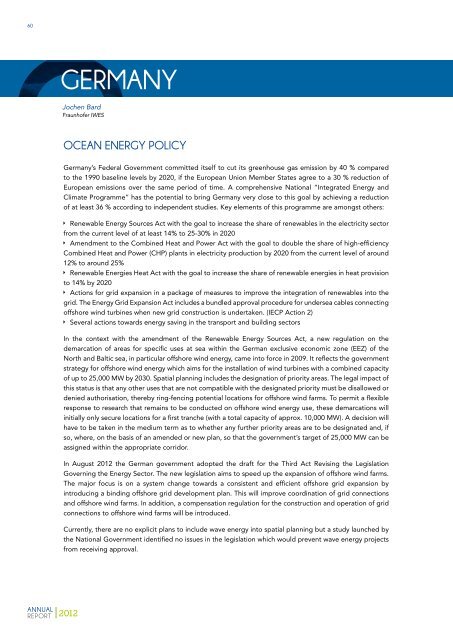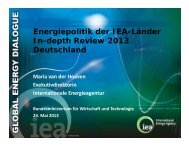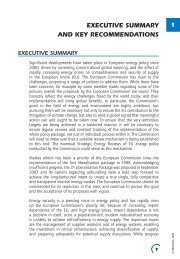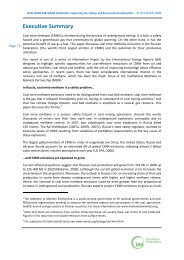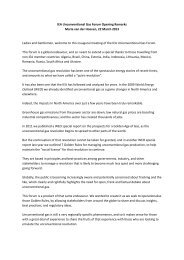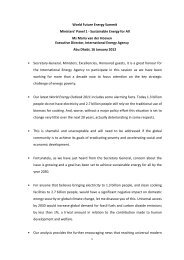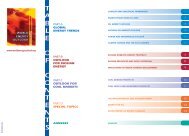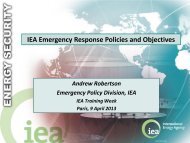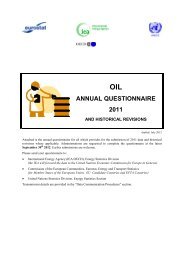OES Annual Report 2012 - Ocean Energy Systems
OES Annual Report 2012 - Ocean Energy Systems
OES Annual Report 2012 - Ocean Energy Systems
You also want an ePaper? Increase the reach of your titles
YUMPU automatically turns print PDFs into web optimized ePapers that Google loves.
60<br />
GERMANY<br />
Jochen Bard<br />
Fraunhofer IWES<br />
OCEAN ENERGY POLICY<br />
Germany’s Federal Government committed itself to cut its greenhouse gas emission by 40 % compared<br />
to the 1990 baseline levels by 2020, if the European Union Member States agree to a 30 % reduction of<br />
European emissions over the same period of time. A comprehensive National “Integrated <strong>Energy</strong> and<br />
Climate Programme” has the potential to bring Germany very close to this goal by achieving a reduction<br />
of at least 36 % according to independent studies. Key elements of this programme are amongst others:<br />
ÌÌ<br />
Renewable <strong>Energy</strong> Sources Act with the goal to increase the share of renewables in the electricity sector<br />
from the current level of at least 14% to 25-30% in 2020<br />
ÌÌ<br />
Amendment to the Combined Heat and Power Act with the goal to double the share of high-efficiency<br />
Combined Heat and Power (CHP) plants in electricity production by 2020 from the current level of around<br />
12% to around 25%<br />
ÌÌ<br />
Renewable Energies Heat Act with the goal to increase the share of renewable energies in heat provision<br />
to 14% by 2020<br />
ÌÌ<br />
Actions for grid expansion in a package of measures to improve the integration of renewables into the<br />
grid. The <strong>Energy</strong> Grid Expansion Act includes a bundled approval procedure for undersea cables connecting<br />
offshore wind turbines when new grid construction is undertaken. (IECP Action 2)<br />
ÌÌ<br />
Several actions towards energy saving in the transport and building sectors<br />
In the context with the amendment of the Renewable <strong>Energy</strong> Sources Act, a new regulation on the<br />
demarcation of areas for specific uses at sea within the German exclusive economic zone (EEZ) of the<br />
North and Baltic sea, in particular offshore wind energy, came into force in 2009. It reflects the government<br />
strategy for offshore wind energy which aims for the installation of wind turbines with a combined capacity<br />
of up to 25,000 MW by 2030. Spatial planning includes the designation of priority areas. The legal impact of<br />
this status is that any other uses that are not compatible with the designated priority must be disallowed or<br />
denied authorisation, thereby ring-fencing potential locations for offshore wind farms. To permit a flexible<br />
response to research that remains to be conducted on offshore wind energy use, these demarcations will<br />
initially only secure locations for a first tranche (with a total capacity of approx. 10,000 MW). A decision will<br />
have to be taken in the medium term as to whether any further priority areas are to be designated and, if<br />
so, where, on the basis of an amended or new plan, so that the government’s target of 25,000 MW can be<br />
assigned within the appropriate corridor.<br />
In August <strong>2012</strong> the German government adopted the draft for the Third Act Revising the Legislation<br />
Governing the <strong>Energy</strong> Sector. The new legislation aims to speed up the expansion of offshore wind farms.<br />
The major focus is on a system change towards a consistent and efficient offshore grid expansion by<br />
introducing a binding offshore grid development plan. This will improve coordination of grid connections<br />
and offshore wind farms. In addition, a compensation regulation for the construction and operation of grid<br />
connections to offshore wind farms will be introduced.<br />
Currently, there are no explicit plans to include wave energy into spatial planning but a study launched by<br />
the National Government identified no issues in the legislation which would prevent wave energy projects<br />
from receiving approval.<br />
ANNUAL<br />
REPORT <strong>2012</strong>


